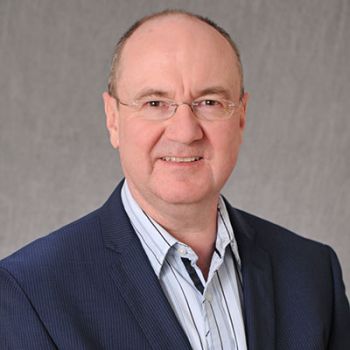
WASHINGTON (July 17, 2014) — The road to finding a cure for HIV-1 is not without obstacles. However, thanks to cutting-edge research by Douglas Nixon, M.D., Ph.D., and colleagues, performed at the George Washington University (GW), Oregon Health & Science University, the University of Rochester, and UC San Francisco, the scientific community is one step closer to finding a viable immunotherapy option for HIV-1, using an immune attack against a fossil virus buried in the genome.
A major hurdle in eradicating HIV-1 has been outsmarting the frequent mutations, or changing coats of the virus caused by its high rate of replication. Researchers have focused on neutralizing antibodies directed against the HIV-1 envelope in order to stop the virus, but the antibodies haven’t been able to keep up with this constant change. Nixon’s research team found that the right antibody directed against an ancestral fossil virus buried within everyone’s genomes might be able to target HIV-1 and neutralize it.
“What we’ve found is an antibody that recognizes these fossil viruses within all our genomes, which can neutralize HIV-1 in a way that has never been seen before,” said Nixon, chair of the Department of Microbiology, Immunology, and Tropical Medicine at the GW School of Medicine and Health Sciences. “We have found in vitro, in the test tube, that you can actually have an antibody work against HIV-1, which is not directed against the HIV-1 virus itself.”
In his research, Nixon and colleagues found that by targeting the fossil virus — an ancestral version of a retrovirus that has become a largely useless part of our DNA — that these antibodies could focus on a single fixed envelope, as it does not change like the constant changes of HIV-1’s envelope outer coat. This discovery provides a new, therapeutic target to beat this particular coat, or variation.
The article, “An Antibody Recognizing Ancestral Endogenous Virus Glycoproteins Mediates Antibody Dependent Cellular Cytotoxicity on HIV-1 Infected Cells” was published in the Cutting Edge section of the Journal of Immunology. This section presents short reports describing significant advances in the area of immunology; chief criteria for acceptance are scientific novelty and quality, originality, clarity, and conciseness.
The authors on this publication are Henri-Alexandre Michaud, Ph.D., of the Division of Experimental Medicine, University of California, San Francisco and the Equipe Immunité et Cancer, Institut de Recherche en cancérologie de Montpellier, Montpellier, France; Devi SenGupta, M.D., of the Division of Experimental Medicine, University of California, San Francisco; Miguel de Mulder Ph.D., of The George Washington University; Steven G. Deeks, M.D., of the Positive Health Program, University of California, San Francisco; Jeffrey N. Martin, M.D., Division of Epidemiology, University of California, San Francisco; James J. Kobie, Ph.D., assistant professor in the Department of Medicine, Infectious Diseases at the University of Rochester Medical Center; Jonah B. Sacha, Ph.D., at the Vaccine and Gene Therapy Institute at Oregon Health & Science University; and Douglas F. Nixon. M.D., Ph.D. of The George Washington University.
Funding for this work came from the National Institutes of Health, the Bill and Melinda Gates Foundation, The Foundation for AIDS Research, and The Peter And Shelagh Godsoe Family Foundation.


